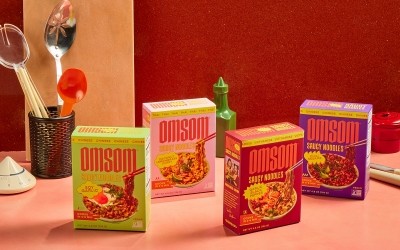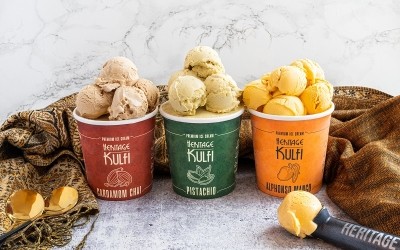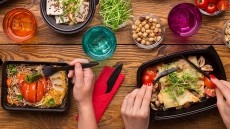Asian food company Helion Food serves up sustainable, nutritious, and shelf-stable meals

"We see the trend of the current consumption is convenience, taste, and healthiness of the food is actually quite important for the modern consumers," Zhang said. "There are instant foods, which is symbolized by instant noodles, those are very unhealthy, there's no nutritional effects. And then there's frozen food. But the frozen food we believe that it [wastes] so much energy in production, transportation, storage, and retail chain, and that will cause a much bigger greenhouse effect for our society and the earth."
Convenience, sustainability in a pouch
While in Asia the soft-pouch format has been "mainstream for many years, in the US, we are slowly adapting these newer technologies,” Zhang said. Though the shelf-stable market has been expanding, canned and frozen meals have been far more common in the US market, he added. The ready-to-eat meals market is estimated to be worth $550bn in 2023 and is expected to grow by a 6.85% CAGR from 2023-2028, according to Statista data.
Helion Food offers a range of shelf-stable, microwavable dinners under its ShanYi brand, including Japanese Curry Tuna, Teriyaki Tuna Steak, Thai Panang, Green Curry with Salmon, and Tuna and Jasmine Rice. And when Helion Food started its business in 2022, a key focus was on delivering sustainable, nutritious, and convenient food, said Eliza Yu, COO of Helion Food.
“We actually do pay attention to ingredients, not only clean label, but actually our fish that the salmon and tuna they're all wild caught from a sustainable source too, so basically we only source from [a] fishery [or] a fisherman who actually practice the same sustainable farming. So that's one thing that we're very proud of is we put that much detail into choosing our ingredients.”
Not only is Helion Food able to maintain the freshness of its products without preservatives through its manufacturing process, but it's also more sustainable than frozen alternatives, Zhang mentioned. Since frozen meals have to be frozen until a consumer puts it in their cart, it uses a lot more energy than shelf-stable products, he added.
"In terms of frozen food, you have to keep it frozen from the moment you're coming out of the production line, and also, in US logistic chain is quite long right," Zhang said. "In this whole chain from a [boxed meal] that's produced to this point it gets to consumers home it's actually a quite long process. Even for a very efficient company, you're talking about at least a month, most likely, it's a lot longer than that."
Growing the brand: Using digital, physical channels together
Helion Food is taking a methodical approach to expansion, ensuring consumers have a variety of options to purchase its product online from Amazon to its branded site and also looking at the retail channel that makes the most sense, Zhang said. Helion Food is also tweaking its packaging even further to ensure the color scheme and branding resonate with consumer, he added.
“I think we spend more manpower in terms of digital marketing and our website. But traditional channel like Sprouts is definitely a great way of still promoting your product. We believe that online or offline has to be a cohesive kind of working together approach. We believe that online or offline has to be a cohesive kind of working together approach, either one of them does not give the company or the consumer the most benefits."
















